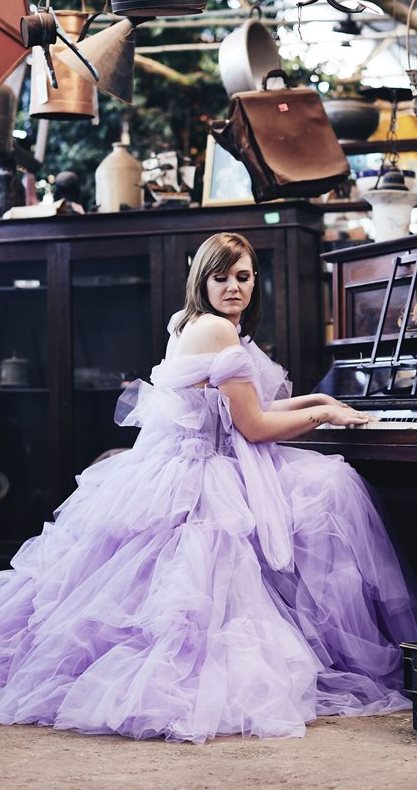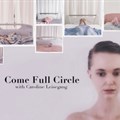
Image credit: Anna-Belle Durrant.
What did you what to be when you were growing up?
Weirdly enough I wanted to either be a beautician or a hairdresser and, maybe at some point, I thought I would be a physiotherapist – but none of those ever stuck with me.
What’s your earliest memory of classical music?
Going to the Last Night of The Proms with my family, where Richard Cock conducts an orchestra and fireworks always follow at the end.
Who are your biggest inspirations?
Philip Glass and Max Richter, two brilliant composers of our time, but I would also include most of the composers from the Romantic period of classical music. There was such an incredible shift in the way the composers of the time wrote; there became such a strong sense of sentimentalism in the way they composed.
You could start hearing the beauty they saw in their lives and the world and I think that’s why composers since the 1900s started to express themselves and explore different ways of writing music.
What do you love most about being a musician?
I’m constantly privileged in being able to live mostly in my head. I can absorb everything around me and turn it into something I understand and love.
How do you spend your time?
A typical day for me isn’t exciting; you don’t do that much. Well, at least I don’t! I have my crafty hobbies of knitting, sewing and woodwork, but I also spend a lot of time just thinking of music, listening to music and reading.
What skills are necessary for musicians?
You have to be confident enough in your dreams, goals and purpose. If you can’t be sure of what you want to do then you get stuck. Music is such a tricky line of work.
It doesn’t matter if you have a talent or not; the one thing you depend on is being able to sell yourself, being open to meeting new people and exposing yourself to the world of being an artist. You will always be vulnerable but if you stay the course you will accomplish something you are proud of.
What’s difficult about the work?
The biggest challenge of being a musician is that it’s a job you’ve created for yourself. You don’t earn a salary, you have no idea how it’s going to play out and you don’t have the surety that people will take in what you are creating. You must have the dedication and discipline to wake up to every day.
How long have you been working as a musician?
Since I recorded my first piano work, Øyeblikk, in 2015. I set up a small soiree as an unofficial launch at a friend’s restaurant; that was the first time I performed publicly for exactly seven minutes.
It was terrifying and exhilarating! I’m not a performer; I’m shy and self-deprecating when it comes to being the person being seen. I never thought anyone would like my album but the response was so positive and overwhelming.
What was the inspiration for the new album?
There’s not one specific inspiration. It’s a culmination of me and my life and how people and moments become part of you. It was also an excuse for me to start getting back to the thing I love most.
What are the underlying themes you’re exploring in this album?
There’s no real theme to it or in it. There’s such a contrast: a variety of complexity and simplicity all in one. That’s the beauty of a prelude; it’s something short that can stand on its own.
In some ways it’s similar to what I’ve recorded before but, at the same time, I’m accepting a more contrasted body of works where I can mix the virtuosic with something so simple.
Which of these themes are common to your repertoire as a whole?
I think the repetition of sections of each piece is common. I’m starting to think it’s becoming a case of me finding my sound and my way of writing, and I’ve realised that it mirrors my personality. I’m one of those people who will stay stuck on repeat until I can find something else to put on repeat.
Why do you think your work creates such a strong connection among your listeners?
The reception I’ve had to my music differs from person to person. For some reason, people manage to connect with it and I’m proud of that because it’s almost as if I’m having a conversation.
How do you hope this album will impact listeners?
I hope that it will move them and I hope it will become part of them in the way that it’s become part of me. I’d like to leave them with a sense of themselves.
Sometimes I’ll practice a piece and think it’s the most terrible thing, but then there are times I play and I think to myself “wow, maybe this is something special.” So the best I can hope for is that they are left with something special.
 What bigger impact do you hope to have with your music?
What bigger impact do you hope to have with your music? The only legacy I’d like to leave with my music is for it to live long and be listened to as much as possible. As a composer, I don’t write music just for myself.
Yes, it’s predominately about me, but you write music because you want to share it. You want people to absorb it into their own lives and feel as though it’s something they’ve created because, at the end of the day, all my music has been created in some way by the people in my life.


































 What bigger impact do you hope to have with your music?
What bigger impact do you hope to have with your music? 
